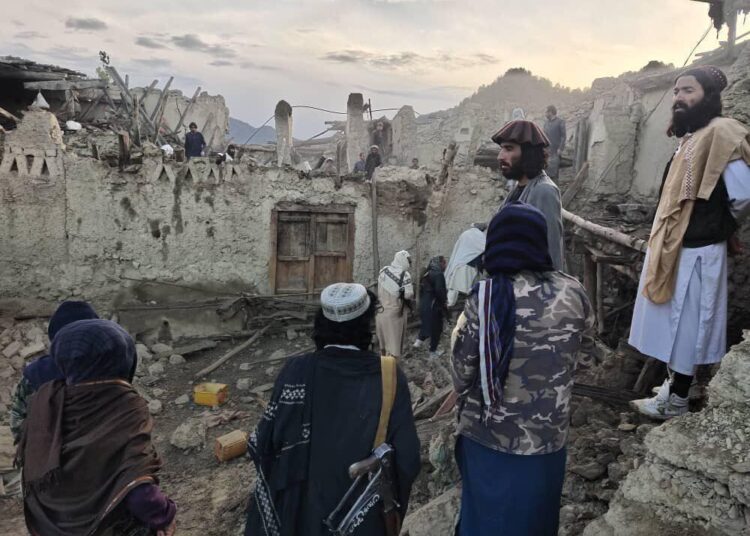GAYAN, Afghanistan — Villagers rushed to bury the dead Thursday and dug by hand through the rubble of their homes in search of survivors of a powerful earthquake in eastern Afghanistan that killed at least 1,000 people. The Taliban and the international community that fled their takeover struggled to bring help to the disaster’s victims, AP reported.
Under a leaden sky in Paktika province, which was the epicenter of Wednesday’s magnitude 6 earthquake, men dug a line of graves in one village, as they tried to lay the dead to rest quickly in line with Muslim tradition. In one courtyard, bodies lay wrapped in plastic to protect them from the rains that are hampering relief efforts for the living.
The quake was Afghanistan’s deadliest in two decades, and, with the full extent of the destruction among the villages tucked in the mountains only slowly coming to light, officials said the toll could rise. An estimated 1,500 others were reported injured, the state-run Bakhtar News Agency said.
“They don’t have anything to eat, they are wondering what they can have to eat, and it is also raining,” a Bakhtar reporter said in footage from the quake zone. “Their houses are destroyed. Please help them, don’t leave them alone.”
The disaster heaps more misery on a country where millions already faced increasing hunger and poverty and the health system has crumbled since the Taliban retook power nearly 10 months ago amid the U.S. and NATO withdrawal.
How the international humanitarian community, which has pulled back significant resources from the country, will be able to offer aid and to what extent the Taliban government will allow it to remain in question. The Taliban’s takeover led to a cutoff of vital international financing, and most governments remain wary of dealing directly with them.
On Wednesday, a UN official said the government had not requested that the world body mobilise international search-and-rescue teams or obtain equipment from neighboring countries, despite a rare plea from the Taliban’s supreme leader, Haibatullah Akhundzadah, for help from the world.
U.N. agencies are facing a $3 billion funding shortfall for Afghanistan this year, and Peter Kessler, a spokesman for the United Nations’ refugee agency, said that means there will be difficult decisions about who gets aid.
In addition to the political and financial concerns, there were also logistical challenges to getting aid to remote villages. The roads, which are rutted and difficult to travel in the best of circumstances, may have been badly damaged in the quake, and landslides from recent rains have made some impassible. Though just 175 kilometers (110 miles) directly south of the capital, Kabul, some villages in Gayan District took a full day’s drive to reach.
Rescuers rushed in by helicopter — and Associated Press journalists also saw ambulances in the quake zone on Thursday — but heavier equipment will be difficult to deliver.
Walls and roofs of dozens of homes in Gayan collapsed in the quake, and villagers said whole families were buried under the rubble. Associated Press journalists counted some 50 bodies in the area alone, as people laid out their dead in front of their houses and in their courtyards.
While modern buildings withstand magnitude 6 earthquakes elsewhere, Afghanistan’s mud-brick homes and landslide-prone mountains make such quakes more dangerous. Shallow earthquakes also tend to cause more damage, and experts put the depth of Wednesday’s at just 10 kilometers (6 miles).
Despite the challenges, officials from several UN agencies said the Taliban were giving them full access to the area.
In neighboring Khost province’s Speray district, which also sustained serious damage, men stood atop what once was a mud home. The quake had ripped open its timber beams. People sat outside under a makeshift tent made of a blanket that blew in the breeze.
Survivors quickly prepared the district’s dead, including children and an infant, for burial. Officials fear more dead will be found in the coming days.
“The toll this disaster will have on the local communities … is catastrophic, and the impact the earthquake will have on the already stretched humanitarian response in Afghanistan is a grave cause for concern,” said Adnan Junaid, vice president for Asia for the International Rescue Committee. “The areas most affected are some of the poorest and most remote areas in Afghanistan, which lack the infrastructure to withstand disasters like this.”






Discussion about this post